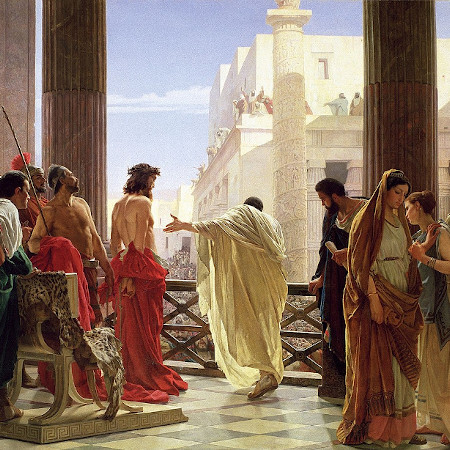The Glory of Jesus SDR – Condemned is a study in the miscarriage of justice. The legal system failed in a few different ways. Part of the problem is that the corruption was rampant. I know there has always been government corruption, but this was out of control. In the Roman government the bar for justice had been lowered to order. For the most part business could be conducted.
Enter the Son of God. Jesus had been arrested last night, already tried twice, once before the god-father, Annas – right after that before the current High Priest, Caiaphas. These two had been so neutered that they couldn’t just kill someone – although this whole affair makes you wonder. They needed Rome’s permission to actually execute Jesus.
The crimes against Jesus were, 1) subverting the nation, 2) tax evasion, and 3) claiming to be a king. Pontius Pilate knew the lot that brought Jesus. The first two were serious offenses, but none that they had ever cared about before. Why are they starting now? Pilate dismissed them off hand. The third obviously betrays their jealousy – this could be interesting.
The question of Jesus being a king brings Pilate quickly down a path where he realizes that Jesus isn’t worth of death. However, is Jesus worth Pilate risking some of his precious political capitol? If word gets back to Rome that Pilate is protecting rebels, that won’t look good. Some ancient historian muse that Pilate was on a short leash after cruel behavior toward the Jews. It ends up that Pilate literally washes his hands of Jesus, leaving him to the murderous whims of his accusers.
The topic of truth sneaks into the conversation. Jesus is truth. Everything that he is, says and does is a reflection of the truth. This is the truth of God’s love and everything that he says in his word. Pilate he probably seen every lie you could imagine. He sneers, “What is truth?” His comment is a reflection on our post modern society. Your truth is whatever you want it to be. The only sin is if you deny my truth. More than a decade ago some researchers at Chapel Hill gave a name to the religion that they found among students. It wasn’t Christianity. This is Moralistic Therapeutic Deism.
When Christian Smith and his fellow researchers with the National Study of Youth and Religion at the University of North Carolina at Chapel Hill took a close look at the religious beliefs held by American teenagers, they found that the faith held and described by most adolescents came down to something the researchers identified as “Moralistic Therapeutic Deism.”
As described by Smith and his team, Moralistic Therapeutic Deism consists of beliefs like these: 1. “A god exists who created and ordered the world and watches over human life on earth.” 2. “God wants people to be good, nice, and fair to each other, as taught in the Bible and by most world religions.” 3. “The central goal of life is to be happy and to feel good about oneself.” 4. “God does not need to be particularly involved in one’s life except when God is needed to resolve a problem.” 5. “Good people go to heaven when they die.”
That, in sum, is the creed to which much adolescent faith can be reduced. After conducting more than 3,000 interviews with American adolescents, the researchers reported that, when it came to the most crucial questions of faith and beliefs, many adolescents responded with a shrug and “whatever.”
Want to hear more? Watch this weeks Bible study from our series – The Glory of Jesus SDR – Condemned.
Please click HERE to find the rest of the lessons.
Please click HERE for the Bible class slides.


